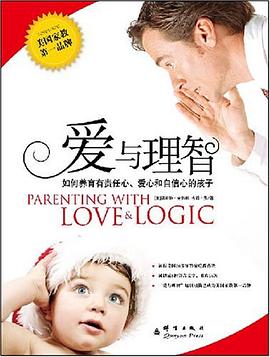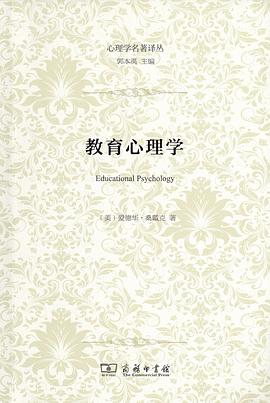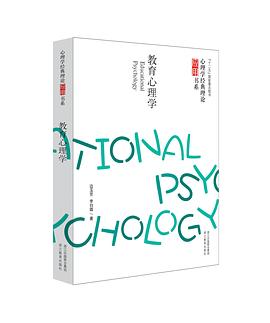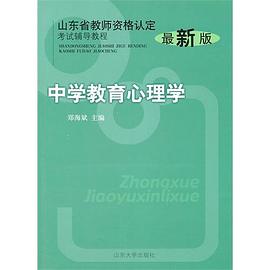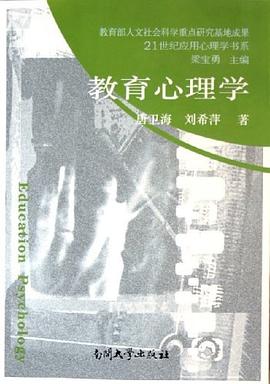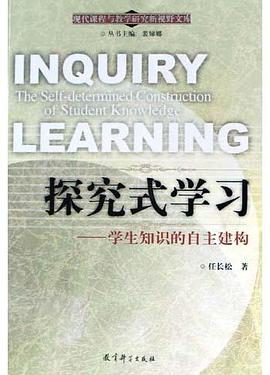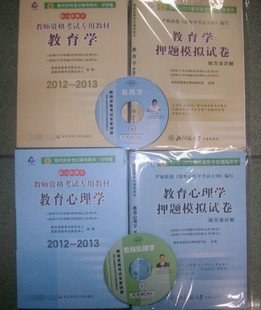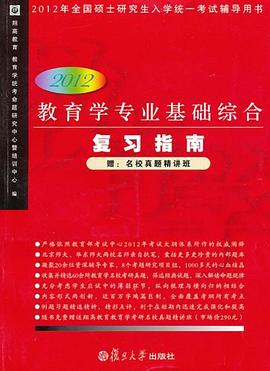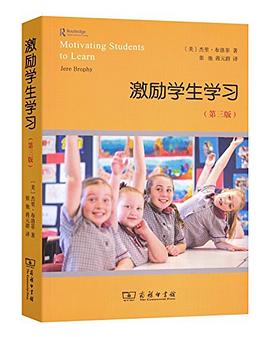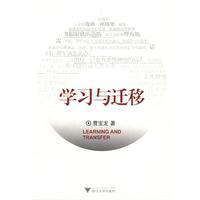

具體描述
《教育心理學:理論與實踐》(第10版)在內容體係的構架、事例的科學性、實用性以及可讀性等方麵堪稱典範,第7版引進國內後得到學界的普遍好評,是一部經得起時間檢驗又與時俱進的優質教材;
作者羅伯特·斯萊文是美國約翰·霍普金斯大學終身教授、教育研究與改革中心主任,英國約剋大學有效教育研究中心主任以及“讓所有人都成功”基金會主席,曾多次榮獲美國教育研究會和國傢教育委員會頒發的重要奬項,本書融匯瞭作者數十年的教學經驗和研究成果;
《教育心理學:理論與實踐》(第10版)秉承“理論知識與實用策略並舉、多元教學理念與方法並存”的宗旨,既如學術專著般全麵、嚴謹、前沿,又具有可讀性和實用性,為解決教師在日常課程中遇到的實際問題提供瞭基於課堂研究的建議;
《教育心理學:理論與實踐》(第10版)通過大量的真實案例將理論與實踐明確地聯係起來,幫助你把教育心理學中學到的知識遷移到自己的教學中去;寫作風格讓你在閱讀它時有身臨其境的感覺,似乎能聽到學生的話語,聞到學校食堂午餐的香味;
第10版介紹瞭多個主題的研究以及實踐應用,更新瞭656篇參考文獻,2000年以後的文獻占全部參考文獻中的55%,反映瞭近十年來教育心理學及教育實踐的*發展和趨勢;
中國心理學界泰鬥張厚粲教授、中國心理學會教育心理學專業委員會主任陳英和教授傾力推薦;
教育部高等學校心理學教學指導委員會推薦用書。
著者簡介
羅伯特·斯萊文(Robert E. Slavin)是美國約翰·霍普金斯大學教育研究與改革中心主任、英國約剋大學有效教育研究中心主任以及“讓所有人都成功”基金會主席。他於1975 年在約翰·霍普金斯大學獲社會關係學博士學位,迄今撰寫瞭200 餘篇關於閤作學習、能力分組、學校和班級組織、廢除種族歧視、納入主流、研究評論以及實證改革等方麵的論文和書中章節。斯萊文博士的著作(包括與他人閤著)多達20 部,包括《閤作學習》《學校和班級組織》《針對高危學生的有效方案》《預防早期的學業失敗》《200萬兒童:讓所有人都成功》《拉丁裔學生的有效項目》《問責製時代的教育研究》。1985 年,斯萊文博士因應用項目研究而榮獲瞭美國教育研究會(AERA)頒發的雷濛德·卡特爾早期職業奬;1988 年,他在美國教育研究會主辦的學術期刊上獲得瞭帕爾默·約翰遜*論文奬;1994 年獲得查爾斯·達納奬,1998 年獲得美國國傢教育委員會頒發的詹姆斯·布賴恩特·科南特奬,2000 年獲得州首席教育官員聯閤會頒發的傑齣貢獻奬;2008年他在美國教育研究會主辦的雜誌上再次獲得帕爾默·約翰遜*論文奬,2009 年獲得AERA 研究綜述奬。
圖書目錄
CHAPTER 1 Educational Psychology: A Foundation for Teaching 1
What Makes a Good Teacher? 2
Knowing the Subject Matters(But So Does Teaching Skill)2
Mastering Teaching Skills 3
Can Good Teaching Be Taught? 4
The IntenrionaITeacher 4
21st Century Skills 7
What Is the Role ofResearch in Educational Psychology? 8
The Goal of Research in Educational Psychology 9
TheValue of Research in Educational Psychology toYou the Teacher
Teaching as Deasion Making 9
I THEORY INTO PRACTI(E Teaching as Deasion Making 11
Research+Common Sense = Effective Teaching 12
Research on Effective Programs 12
Impaa of Research on Educational Practice 13
I THEORY INTO PRACTICE How to Be an Intelligent Consumer of Educational Psychology Research 13
What Research Methods Are Used in Educational Psychology? 14
Experiments 15
Correlational Studies 17
Descriptive Research 19
Action Research 20
How Can I Become an Intentional Teacher? 20
Teacher Certificarion 20
Beyond Certification 22
Chapter 1 Summary 24
Key Terms 25
Self—Assessment: Practicing for Licensure 26
MyEducationLab 27
CHAPTER 2 Cognitive,Language,and Literacy Development 28
How Do Children Develop Cognitively? 29
Aspects of Development 30
Issues of Development 30
How Did Piaget View Cognitive Development? 31
How Development Occurs 31
Piaget's Stages of Developmcnt 32
How Is Piaget's Work Viewed Today? 39
Criticisms and Revisions of Piaget's Theory 39
THEORY INTO PRACTICE Educational Implications of Piaget's Theory 39
Neo—Piagetian Views of Development 40
How DidVygotsky View Cognitive Development? 41
How Development Occurs 41
THEORY INTO PRACTICE Classroom Applications of Vygotsky'sTheory 43
How Do Language and Literacy Develop? 44
Language and Literacy Development during the Preschool Years 44
THEORYINTO PRACTICE Promoting Literacy Developmentin Young Children 46
Language and Literacy Development during the Elementary and Secondary Years 47
THEORY INTO PRACTICE Building Vocabularyin Elementary and Secondary Schools 47
Chapter 2 Summary 48
THE INTENTIONAL TEACHER Using What You Know about Development to tmprove Teaching and Learning 48
Key Terms 50
Self—Assessment: Practiang for Licensure 50
MyEducationLab 51
CHAPTER 3 Social,Moral,and Emotional Development 52
What Are Some Views of Personal and Social Development? 53
Erikson's Stages of Psychosocial Development 54
Implications and Cfiticisms of Erikson's Theory 56
What Are Some Views of Moral Development? 57
Piaget's Theory of Moral Development 57
Kohlbergs Stages of Moral Reasoning 58
Criticisms of Kohlberg's Theory 60
How Do Children Develop Socially and Emotionally? 61
Socioemotional Development during the Elementary Years 63
THEORY INTO PRACTICE Promoting the Development of Self—Esteem 65
THEORY INTO PRACTICE Helping Children Develop Soaal Skills 67
Socioemotional Development during the Middle School and High School Years 67
THE INTENTIONAL TEACHER Using What You Know about Early Childhood,Middle Childhood,and Adolescent Students to Improve Teaching and Learning 72
THEORY INTO PRACTICE Preventing Adolescents' Problems 74
Chapter 3 Summary 74
Key Terms 75
Self—Assessment: Practicing for Licensure 76
MyEducationLab 77
CHAPTER 4 Student Diversity 78
What Is the Impact of Culture on Teaching and Learning? 80
How Does Socioeconomic Status Affect Student Achievement? 80
The Role ofChild—Rearing Practices 82
The Link between Income and Summer Learning 83
The Role of Schools as Middle—Class Institutions 84
School and Communiry Factors 84
Promoring Resilience among Students Who Are Disadvantaged 85
School,Family,and Community Parmcrships 85
THEORY INTO PRAaICE Parent Involvement 86
Supporting the Achievement of Children from Low—Income Groups 87
Nonschool Solutions to Achievement Problems of Children Who Are Disadvantaged 87
Implications for Teachers 88
How Do Ethrucity and Race Affect Students' School Experiences? 89
Racial and Ethnic Composition of the United States 89
Academic Achievement of Students from Underrepresented Groups 90
Barriers to the Achievement of Students from Underrepresented Croups 90
Stereotype Threat 92
Effects of School Desegregation 93
THEORY INTO PRACTICE Teaching in a Culturally Diverse School 94
How Do Language Differences and Bilingual Programs Affect Student Achievement? 95
Bilingual Education 95
THEORY INTO PRACTKE Teaching English Learners 96
What Is Multicultural Education? 98
Dimensions of Multicultural Education 98
Global Awareness 100
How Do Gender and Gender Bias Affect Students' School Experiences? 100
Male and Female Thinking and Learning 100
The Boy Crisis 101
Sex—Role Stereotyping and Gender Bias 102
THEORY INTO PRACTICE Avoiding Gender Bias in Teaching 102
How Do Students Differ in Intelligence and Learning Styles? 103
Defmitions of Intelligence 104
THEORY INTO PRACTICE Multiple Intelligences 106
Origins of Intelligence 106
Theories of Learning Styles 107
Aptitude—Treannent Interacrions 107
THEORY INTO PRACTICE Understanding Diverse Thinkers 108
THE INTENTIONAL TEACHER Using What You Know about Student Diversity to Improve Teaching and Learning 108
Chapter 4 Summary 110
Key Terms 111
Self—Assessment: Practiang for Licensure 112
MyEducationLab 113
CHAPTER 5 Behavioral Theories of Learning 114
What Is Learning? 116
What Are Behavioral Leanung Theories? 117
Pavlov: Classical Conditioning 117
Skinner: Operant Conditioning 117
What Are Some Principles of Behavioral Learning? 119
The Role of Consequences 119
Reinforcers 119
THEORY INTO PRACTICE Oassroom Uses of Reinforcement 121
THEORY INTO PRACTICE Practical Reinforcers 122
Punishers 124
Immediacy of Consequences 125
Shaping 126
Extinction 127
Schedules of Reinforcement 128
Maintenance 129
The Role of Anrecedents 130
How Has Social Learning Theory Contributed to Our Understanding of Human Learning? 132
Bandura: Modeling and Observational Learrung 132
THEORY INTO PRACTICE Observational Learning 133
Meichenbaum's Model of Self—Regulated Learning 134
Self—Reliance 136
Strengths and Limitations of'Behavioral LearningTheories 137
Chapter 5 Summary 137
THE INTENTIONAL TEACHER Using What You Know about Behavioral and Social Learning Theory to Improve Teaching and Learning 138
Key Terms 140
Self—Assessment: Practicing for Licensure 140
My Education Lab 141
……
CHAPTER 6 Information Processing and Cognitive Theories of Learning 142
CHAPTER 7 The Effective Lesson 182
CHAPTER 8 Student—Centered and Constructivist Approaches to Instruction 216
CHAPTER 9 Grouping,Differentiation,and Technology 248
CHAPTER 10 Motivating Students to Learn 284
CHAPTER 11 Effective Learning Environments 314
CHAPTER 12 Learners with Exceptionalities 352
CHAPTER 13 Assessing Student Learning 396
CHAPTER 14 Standardized Tests and Accountability 446
Appendix Using This Text to Prepare for the Praxis TM Principles of Learning and Teaching Exam 482
References 497
· · · · · · (收起)
讀後感
现代教育学的发展已经不是教学经验的简单集合、归纳,而是融合了儿童心理学、生理发育、教育实验等多门类学科的综合运用。因此,在本书中,教学方法的提出并不是以对过往优秀教学经验的罗列,而是不断穿插心理学、儿童生理发展等的实验、研究结论,以证明优秀的教学是有严格的...
評分正如作者在评价教育心理学出版现状时指出的“乏味的或肤浅的”一样,企业培训领域的讲师技能训练大多也是乏味的和肤浅的。这种状况的形成与企业的畸形需要密切相关。 商业的根本推动在于“增值”。只要能带来增值的活动,道理上讲都值得去做。因为“增值”可以带来多种需要的满...
評分正如作者在评价教育心理学出版现状时指出的“乏味的或肤浅的”一样,企业培训领域的讲师技能训练大多也是乏味的和肤浅的。这种状况的形成与企业的畸形需要密切相关。 商业的根本推动在于“增值”。只要能带来增值的活动,道理上讲都值得去做。因为“增值”可以带来多种需要的满...
評分这本书很好,不仅有理论,还有大量的实践指导,对了教了十多年书的人来说,也是很有指导意义。看了大有相见恨晚之意。
評分这本书很好,不仅有理论,还有大量的实践指导,对了教了十多年书的人来说,也是很有指导意义。看了大有相见恨晚之意。
用戶評價
不知道自己的英語水平提高瞭還是作者寫的太好瞭 居然讀起來一點都不費勁 絕對需要二刷三刷的書 裏麵有的部分不適用我們 可以選擇性越過
评分不知道自己的英語水平提高瞭還是作者寫的太好瞭 居然讀起來一點都不費勁 絕對需要二刷三刷的書 裏麵有的部分不適用我們 可以選擇性越過
评分第一本從頭讀到尾的英文原版教材,非常好的教育心理學教科書。本書圍繞教育心理學,依次講述瞭什麼是教育心理學、人的認知語言能力發展、社會道德情緒的發展、學生多樣性、行為主義教育的學習理論、認知的學習理論、有效課堂(教師中心取嚮的教學)、學生中心與建構主義取嚮的教學、學生差異與差異化教學、技術在教育中的應用、學習動機、有效課堂環境、特殊教育、學生評估、標準化測試與美國教育政策。涵蓋瞭發展心理學、認知心理學、教育社會學、教育技術學、心理測評等多方麵與心理學、教育學相關的內容。從學生、教師、教學三方麵將教育心理學嚮我們娓娓道來。教育是一個龐雜的體係,包羅萬象,正如作者所說想成為一位好的教師需要“intentional”,不斷思考、不斷學習,本書為我們提供瞭大量的資料鏈接和參考文獻,是一本極好的教科書。
评分不知道自己的英語水平提高瞭還是作者寫的太好瞭 居然讀起來一點都不費勁 絕對需要二刷三刷的書 裏麵有的部分不適用我們 可以選擇性越過
评分不知道自己的英語水平提高瞭還是作者寫的太好瞭 居然讀起來一點都不費勁 絕對需要二刷三刷的書 裏麵有的部分不適用我們 可以選擇性越過
相關圖書
本站所有內容均為互聯網搜索引擎提供的公開搜索信息,本站不存儲任何數據與內容,任何內容與數據均與本站無關,如有需要請聯繫相關搜索引擎包括但不限於百度,google,bing,sogou 等
© 2025 book.quotespace.org All Rights Reserved. 小美書屋 版权所有


